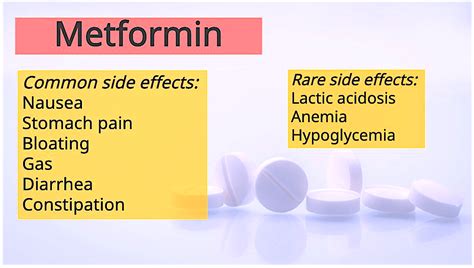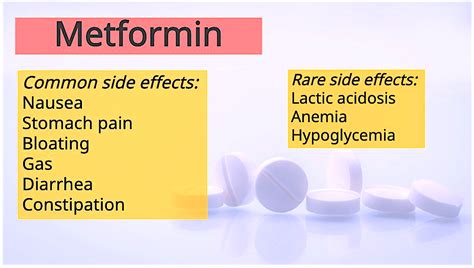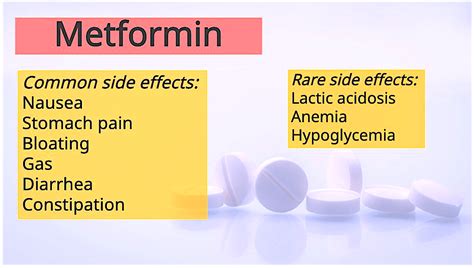Intro
Discover Metformin ER side effects, including nausea, diarrhea, and stomach pain. Learn about common and rare effects, interactions, and management tips for this diabetes medication, also known as extended-release metformin.
Metformin ER, or extended-release metformin, is a medication used to treat type 2 diabetes. It belongs to the biguanide class of medications and works by decreasing glucose production in the liver, improving the body's sensitivity to insulin, and thereby lowering blood sugar levels. While metformin ER is effective in managing diabetes, it can cause several side effects. Understanding these side effects is crucial for patients to manage their condition effectively and maintain a good quality of life.
The importance of recognizing metformin ER side effects cannot be overstated. These side effects can range from mild to severe and may affect various aspects of a patient's health. Some side effects may be temporary and resolve on their own, while others may require medical attention. By being aware of the potential side effects, patients can take proactive steps to mitigate them and work closely with their healthcare providers to adjust their treatment plans as needed.
Metformin ER is generally well-tolerated, but like all medications, it can cause adverse effects. The most common side effects include gastrointestinal symptoms such as diarrhea, nausea, vomiting, and abdominal pain. These symptoms are usually mild and may decrease over time as the body adjusts to the medication. However, in some cases, these side effects can be severe and may lead to dehydration or malnutrition if not properly managed. Patients experiencing severe gastrointestinal side effects should consult their healthcare providers for guidance on managing these symptoms.
Common Side Effects of Metformin ER

Metformin ER can cause a range of common side effects, including:
- Diarrhea
- Nausea
- Vomiting
- Abdominal pain
- Loss of appetite
- Weight loss
- Flatulence
- Bloating
- Indigestion These side effects are usually mild and temporary, but they can be bothersome and affect a patient's daily life. In some cases, patients may need to adjust their diet or take additional medications to manage these side effects.
Less Common Side Effects
In addition to the common side effects, metformin ER can cause less common side effects, including: - Headache - Dizziness - Fatigue - Muscle pain - Joint pain - Increased risk of upper respiratory tract infections These side effects are less frequent but can still have a significant impact on a patient's quality of life. Patients experiencing any of these side effects should discuss them with their healthcare providers to determine the best course of action.Severe Side Effects of Metformin ER

While rare, metformin ER can cause severe side effects that require immediate medical attention. These include:
- Lactic acidosis: a life-threatening condition characterized by high levels of lactic acid in the blood
- Hypoglycemia: low blood sugar levels, which can be severe and even life-threatening if not treated promptly
- Allergic reactions: such as hives, itching, and difficulty breathing
- Liver problems: including elevated liver enzymes and liver failure
- Kidney problems: including kidney failure and increased creatinine levels
Managing Side Effects
To manage metformin ER side effects, patients can take several steps: - Start with a low dose and gradually increase it to minimize gastrointestinal side effects - Take the medication with food to reduce stomach upset - Stay hydrated to prevent dehydration - Follow a balanced diet to manage weight loss and nutrient deficiencies - Monitor blood sugar levels regularly to prevent hypoglycemia - Report any severe side effects to healthcare providers promptlyLong-Term Effects of Metformin ER

Long-term use of metformin ER can have several effects on the body. Some of these effects are beneficial, such as:
- Improved blood sugar control
- Weight loss
- Reduced risk of cardiovascular disease
- Potential reduction in cancer risk However, long-term use can also have negative effects, including:
- Vitamin B12 deficiency
- Increased risk of osteoporosis
- Potential impact on fertility and pregnancy
Vitamin B12 Deficiency
Metformin ER can cause a decrease in vitamin B12 levels, particularly with long-term use. Vitamin B12 is essential for the production of red blood cells, nerve function, and DNA synthesis. A deficiency in vitamin B12 can cause anemia, fatigue, weakness, and neurological problems. Patients taking metformin ER for extended periods should have their vitamin B12 levels monitored regularly.Interactions with Other Medications

Metformin ER can interact with several medications, including:
- Other diabetes medications
- Blood thinners
- Aspirin and other salicylates
- Certain antibiotics
- Cimetidine
- Corticosteroids These interactions can increase the risk of side effects or reduce the effectiveness of metformin ER. Patients should inform their healthcare providers about all medications they are taking to minimize potential interactions.
Patient Education
Patient education is crucial for managing metformin ER side effects. Patients should be informed about: - The potential side effects of metformin ER - How to manage common side effects - The importance of monitoring blood sugar levels and vitamin B12 levels - The risk of severe side effects and when to seek medical attention - How to take the medication correctly to minimize side effectsConclusion and Next Steps

In conclusion, metformin ER is an effective medication for managing type 2 diabetes, but it can cause several side effects. By understanding these side effects, patients can take proactive steps to manage them and maintain a good quality of life. Patients should work closely with their healthcare providers to monitor their condition, adjust their treatment plans as needed, and minimize potential side effects.
We invite readers to share their experiences with metformin ER side effects and how they managed them. Your comments and questions can help others better understand this medication and its effects. Please feel free to comment below or share this article with others who may benefit from this information.
What are the most common side effects of metformin ER?
+The most common side effects of metformin ER include gastrointestinal symptoms such as diarrhea, nausea, vomiting, and abdominal pain.
How can I manage metformin ER side effects?
+To manage metformin ER side effects, start with a low dose and gradually increase it, take the medication with food, stay hydrated, and monitor blood sugar levels regularly.
Can metformin ER cause severe side effects?
+Yes, metformin ER can cause severe side effects, including lactic acidosis, hypoglycemia, allergic reactions, liver problems, and kidney problems. These side effects require immediate medical attention.
